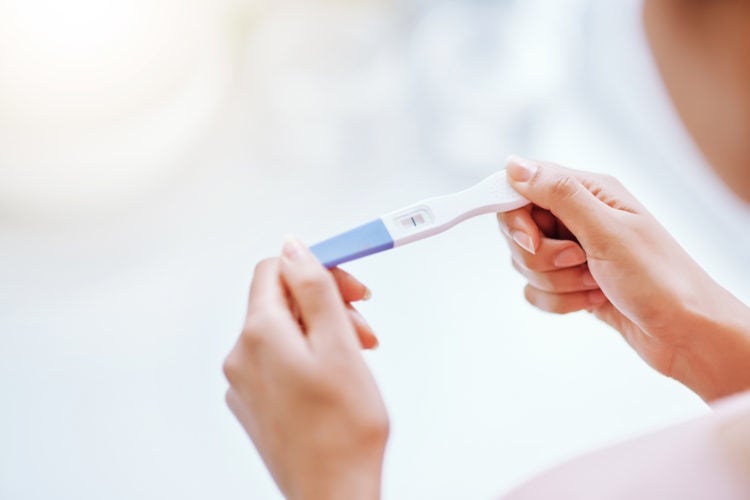-
Celebrity Infertility Spotlight: Samantha Busch

Infertility is often a taboo subject. However, when celebrities speak up about their struggles, it helps the general public understand how “normal” it is to have difficulty getting pregnant. It’s also cathartic to discuss the emotional turmoil of infertility with others who have experienced it.
Samantha Busch—wife of NASCAR driver Kyle Busch—discusses her life on social media and as a cast member of CMT’s Racing Wives. From providing play-by-plays of Kyle’s races to discussing the couple’s infertility to documenting their heartbreaking miscarriage, no topic is off-limits.
Samantha’s journey into motherhood started in 2012 at age 26 when she and Kyle decided to start a family. She chronicled her journey on social media, stating:
“Trying to have a baby was the hardest thing I’ve ever done in life…You could handle one, two, three, four negative pregnancy tests. But by that ninth, 10th, 11th [one], that’s when it’s hard. It’s hard to pick up the pieces again.”
She even opened up about the mental health struggles of treating infertility, saying:
“We started the fertility drugs. They don’t tell you too much about the side effects of them. You turn insane. Nobody’s telling you what’s happening to yourself as a woman and what’s happening to your marriage. Nobody’s telling you that you’re going to sit on the floor and cry for hours and your husband’s going to be there to support you, but at the same time, you’re like, ‘What if I can’t give him kids?’”
Samantha and Kyle’s son, Brexton, joined the Busch family in 2015 via in vitro fertilization (IVF). In an effort to comfort other couples facing similar challenges, Samantha shared her experience with IVF more in-depth when the couple pursued it again last year to have a second child.
The procedure resulted in pregnancy, but Samantha disclosed the devastating news that she had had a miscarriage in November 2018:
“Earlier this week I suffered a miscarriage. We lost our baby girl. My heart hurts more than words can describe.”
While her original intent had been to help others “[not] feel so alone,” it was Samantha who received an outpouring of support from “so many women who had been through the exact same thing and understood the emotion that I was feeling and the pain and the confusion.”
Though speaking up about infertility can be difficult, Samantha says being open about it has been therapeutic. More women share her experience than most people realize. Up to 15 percent of people who know they’re pregnant have a miscarriage. That’s why, through the Kyle Busch Foundation, the couple launched the Bundle of Joy Fund to help couples cover the cost of IVF, which can run thousands of dollars. Samantha continues to share her journey and provide online support to those who need it.
Vasectomy can be a major roadblock to a couple’s fertility, but with vasectomy reversal, you can get back on the path to parenthood. To schedule a free consultation, please call the Center for Vasectomy Reversal at 941.894.6428.
-
How Infertility Can Negatively Impact Your Relationship in More Ways Than One

Even the best marriage can run into trouble when facing the challenges of infertility. Feelings of resentment and disappointment can creep in, and communication can become a struggle. Infertility doesn’t necessarily mean you can never have children, but it does mean that you and your partner will have to try harder than some other people, which can be a challenge. The best way to face it, as with any obstacle in your married life, is together. Be aware of common issues, and be proactive in keeping your marriage strong.
- Don’t let fertility become an obsession. The tedium of charting, doctor’s appointments, giving samples, having injections, and more can make it feel like infertility is your whole life, and waiting for the results can be excruciating. Don’t let it all overwhelm you, but find ways to connect with your partner that doesn’t involve family planning. Have a weekly date night, making a rule that you can’t talk about babies.
- Recognize that life is all about making a new plan. You have to live the life you have, even if it’s not the one you expected. Learning all about infertility, seeking new ways to communicate with your partner, and making a plan to move forward can help alleviate some of your stress.
- Keep your sex life fun. When your sex life is all about fertility apps, calendars, and basal thermometers, it becomes less than sexy. Prioritize date night, making a point to connect in ways that have nothing to do with conception.
- Try not to take your frustrations out on each other. When you’re living with the pain of not being able to conceive, it’s easy to become angry, depressed, or resentful. It’s important to learn how to communicate honestly and calmly, learning to compromise without resorting to anger. Remember that you are in it together, avoid placing blame, and take comfort in the love and compassion you have for each other.
- Don’t allow infertility to isolate you. Infertility can be emotionally isolating, so reach out to others sharing your experience by finding a good support group, either online or locally.
- Be realistic and cooperative when it comes to money. Fertility treatments are expensive, so it’s important to keep emotions out of your budget and come up with a realistic plan together.
If you’re considering a vasectomy reversal, the Center for Vasectomy Reversal is here to help. Under the direction of Dr. Joshua Green, our team provides state-of-the-art treatment for men who need a reversal of their vasectomy or have other concerns about their fertility. We accept major credit cards as well as cash and checks, and offer a payment plan for those who are unable to pay the entire fee at the time of surgery. Whether you’re ready to schedule a procedure or just want to learn more, you can contact us through our website, or call 941-894-6428 to arrange a free consultation.
-
Should Men Take Pre-Natal Vitamins?

When you’re trying to conceive, it’s extremely important to take care of your health. A woman who is trying to get pregnant will work to stay at a healthy weight, watch her diet, stop drinking and smoking, and take prenatal vitamins, to make sure she gives her potential baby the very best start possible. But what about the potential father? Men can also take steps to improve their fertility, including taking prenatal vitamins.
Many of the things men can do to up their chances of fathering a child are the same things that women do when they’re trying to conceive. Maintaining a healthy weight, quitting smoking, and eating a healthful diet are all good steps to take, as are getting enough sleep and reducing stress. Additionally, men who want to procreate should not wear constrictive underwear or take long soaks in the bath or hot tub.
Why take all of these measures? A man’s age, diet, and lifestyle can have an effect on his sperm health, which has an impact on fertility but also on the child’s development and long-term health. A newborn’s predisposition for chronic diseases such as obesity, diabetes, and cardiovascular disease can result from poor behavior or health of the mother or father before they even conceive. Three to six months prior to conception is a great time to improve your lifestyle, and that includes taking a prenatal vitamin.
The best prenatal vitamin for a man to take is not the same as a woman’s prenatal vitamin because some of the nutrients in prenatal vitamins can cause problems for men. It’s advised that men take a multivitamin formulated for adults or specifically for men, rather than taking a prenatal vitamin formulated for a woman. Men need nutrients like calcium and iron, which are in prenatal vitamins, but not at the doses those vitamins contain. In fact, too much calcium has been linked to cardiovascular disease in men, and too much iron can lead to a host of issues, including gastrointestinal problems, liver problems, and dangerously low blood pressure. What’s more, prenatal vitamins contain folic acid, which is important for women to take to prevent birth defects, but which has been linked to an increased risk of prostate cancer. Before taking any kind of supplement, it’s smart to talk to your doctor and get a recommendation for the right formulation for you.
One major roadblock to a man’s fertility is a vasectomy, but even that can be overcome with new microsurgery techniques for reconnecting the vas deferens. If you’re considering a vasectomy reversal, the Center for Vasectomy Reversal is here to help. Under the direction of Dr. Joshua Green, our caring and skilled team provides state-of-the-art treatment for men who need a reversal of their vasectomy or have other concerns about their fertility. We accept major credit cards as well as cash and checks, and we also offer a payment plan option for those who are unable to pay the entire fee at the time of surgery. Whether you’re ready to schedule a procedure or just have questions and want to learn more, you can contact us through our website, or call 941-894-6428 to arrange a free consultation.
-
Can Eating Disorders Cause Male Infertility?

Both eating disorders and infertility in men are underrecognized, yet common health concerns; incidentally, the two can go hand in hand. Eating disorders can cause lasting damage to the body and may result in infertility in men. Often, eating disorders are only associated with women, but men account for about 5-15% of anorexia and bulimia cases and 35% of binge eating disorder cases. Additionally, because these numbers are only based on reported cases, they may actually be higher—many men will suffer in silence with eating disorders. For any man struggling with an eating disorder, seeking treatment is important for many reasons, including the preservation of future fertility. Continue reading to gain a better understanding of how eating disorders can be a cause of male infertility .
Weight Changes and Sperm Quality
Being over- or underweight can have an impact on sperm count as well as sperm motility and overall sperm quality. With anorexia nervosa, men may be dangerously below a healthy weight range, and they might also utilize risky solutions to continue battling body fat, such as diet pills, which can cause further harm to sperm count and quality.
Risks of Over-Exercising
Along with undereating or uncontrollable binge eating, eating disorders may lead to over-exercising, which can further diminish sperm count due to the consistently higher temperature of the testes during exercise.
Potential Nutritional Deprivation
Even with binge eating disorder, which is characterized by binging sessions where someone will consume large quantities of food in a single sitting, malnourishment is common. That’s because the body is not getting the balanced diet it needs to stay healthy, and decreased sperm production may be one of the consequences of that nutritional deprivation.
Dr. Joshua Green at the Center for Vasectomy Reversal is dedicated to providing resources for men struggling with infertility, including those who are looking for vasectomy reversal procedures in Sarasota. To learn more about our practice , give us a call at (941) 894-6428 or visit our website.
-
What Is the Link Between Stress and Infertility?
After a vasectomy reversal, if you are still struggling to conceive, then you may need to consider other causes of infertility for both partners. If your partner is under a great deal of stress, even if your vasectomy reversal was successful, infertility could be a problem.
Watch this video to understand how stress impacts ovulation. Women under stress may not ovulate, which means you won’t be able to conceive after your vasectomy reversal. You may need to see a fertility specialist and consider other treatments after your vasectomy to start a family.
Dr. Green at the Center for Vasectomy Reversal has a proven track record of successful reversal procedures. If you are interested in learning more about vasectomy reversal in Sarasota, please call (941) 894-6428.
-
What to Do When Infertility Persists After Vasectomy Reversal
 The success rate for vasectomy reversals is high. If your v asectomy was less than five years ago , the odds of restoring sperm to the ejaculate with a reversal procedure are 95% or greater, while those whose vasectomies were more than 10 years ago have an 80-90% chance of succeeding. However, a successful vasectomy reversal is only the first step in achieving a pregnancy, and in some cases, infertility persists after the procedure. If you are still struggling to conceive, here is a look at the steps you can take.
The success rate for vasectomy reversals is high. If your v asectomy was less than five years ago , the odds of restoring sperm to the ejaculate with a reversal procedure are 95% or greater, while those whose vasectomies were more than 10 years ago have an 80-90% chance of succeeding. However, a successful vasectomy reversal is only the first step in achieving a pregnancy, and in some cases, infertility persists after the procedure. If you are still struggling to conceive, here is a look at the steps you can take. Review Your Procedure Results
After vasectomy reversal, your surgeon will look for presence of sperm in your ejaculate at set intervals to determine if the procedure was a success. Keep in mind that while most men produce sperm throughout their lifetimes, the levels may vary. You can have a successful vasectomy reversal but have a significantly lower level of sperm in the ejaculate than before your vasectomy. Generally, the more time that has passed since your vasectomy, the lower the levels of sperm in the ejaculate. Your surgeon can discuss issues of low sperm count with you so you can understand how they may impact your goal of growing your family.
Consider Contributing Issues
In some case, female infertility issues can compound male infertility. If you are struggling to conceive after a successful reversal, it is important for your partner to also see her doctor to determine if she has an underlying fertility problem. For both parties, chronic medical conditions can also interfere with fertility, including diabetes and obesity.
Look into Other Options
Your vasectomy reversal surgeon may be able to help with sperm retrieval for fertility treatments, such as IVF. For some couples, additional medical treatment either is not likely to be effective or is unlikely to be successful, in which case adoption could be an option.
At the Center for Vasectomy Reversal, we understand how important starting or growing a family is to our vasectomy reversal surgery patients, and we’re here to offer comprehensive and compassionate care throughout the process. Make an appointment for a consultation for vasectomy reversal in Sarasota today by calling (941) 894-6428.
-
In Focus: Male Factor Infertility
If you are exploring your options for infertility procedures in Sarasota, it is important to first understand the source of your infertility. Watch this video to learn more about male infertility.
Male infertility can be caused by many factors, including sperm disorders, anatomical abnormalities, mitochondrial deletions, PCD, and secondary conditions. Fortunately, vasectomy reversal surgeons like Dr. Joshua Green can help treat these problems with various infertility procedures, including sperm retrieval and IVF.
Dr. Green of the Dr. Joshua Green Center for Vasectomy Reversal and Male Infertility is pleased to offer a wide range of infertility procedures for Sarasota area men. Call (941) 961-4581 to learn more.
Recent Posts
Popular Posts
categories
- Uncategorized
- Sperm Retrieval
- vasectomy reversal
- Emergency
- Dr. Green
- sperm count
- fertility
- male infertility
- MESA
- medical care
- low sperm count
- IVF
- male fertility testing
- anesthesia
- pregnancy
- sperm aspiration
- semen analysis
- post-vasectomy pain syndrome
- infertility
- VE
- anti-sperm antibodies
- older dad
- general anesthesia
- gender reveal party
- post-operative infections
- baby name
- parent
- baby's first year
- fertilization process
- spinal anesthesia
- ACS Fellow
- nutrition tips
- concierge-level care
- fertility planning app
- azoospermia
- out-of-town patients
- V-V
- post-vasectomy reversal
- conceiving
- vasectomy
- vasoepididymostomy
- smoking
- sperm quality
- baby registry
- infographic
- surgical care
- surgical consultation process
- prostate cancer
- baby gender
- family time
- COVID
- Baby Shower
- Child Care
- Halloween Costume Ideas for Babies
- Halloween
- Halloween Safety Tips
- Celebrity Infertility Spotlight
- Postpartum
- testosterone
- Father's Day
- Father
- Men's Health
- Thanksgiving
- Pregnancy Announcement
- Parenting Tips
- Sperm
